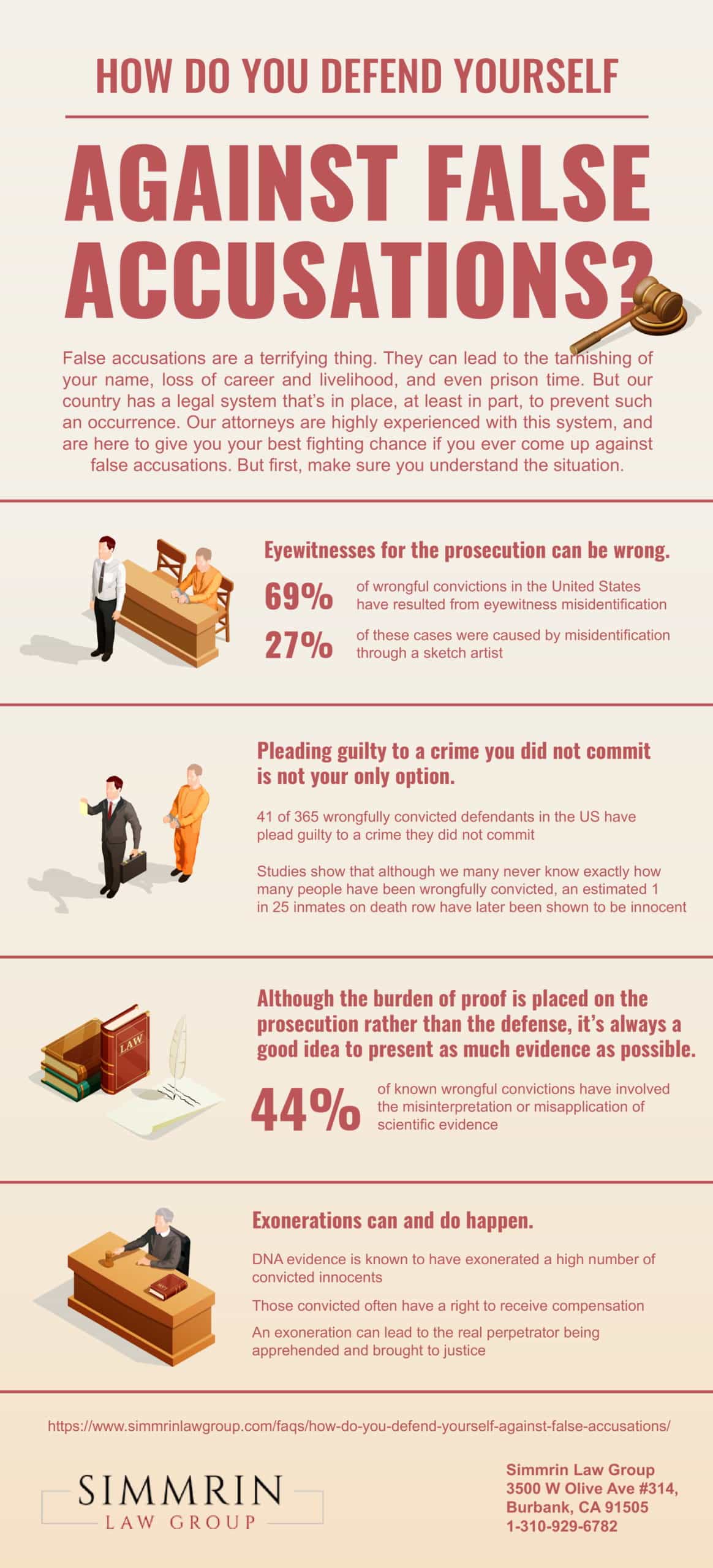When you receive charges for a crime you did not commit, you can receive jail sentences, probation, and significant fines. Conversely, even if you are not proven guilty, you still face severe, and possibly irreversible, damages to your reputation.
Therefore, you must take legal action to fight false accusations and protect your future. But how can you defend against false accusations? We have outlined our defense strategies for wrongful allegation claims below.
Can You Be Convicted of a Crime You Didn’t Commit?
To receive criminal convictions, a prosecutor must prove you are guilty beyond a reasonable doubt. In response, you, as the defendant, have the right to defend yourself and support reasonable doubt.
Most false allegation defenses take one of two approaches:
- You are innocent of all charges
- You are guilty but should not be held responsible
An example of a situation where you may be only partly responsible is if your arresting officer is guilty of entrapment or coercion. Yes, you may have committed the crime, but your responsibility for that crime is limited due to the illegal activities of others.
For a free legal consultation, call (310) 896-2723
Can You Receive Convictions if You Acted in Self-Defense?
Self-defense claims fall under the “you committed a crime but should not be held responsible” defense. When a person acts in self-defense, they have no choice but to use force or violence to protect themselves from harm. Self-defense is when the person has to act to prevent imminent danger to themselves or their property.
Self-defense is a legitimate defense, though it can be challenging to prove. The defendant must show that the actions were necessary and committed within reason. For example, shooting someone who is about to punch you is not a reasonable reaction and can lead to excessive force charges.
The Prosecutor Must Prove Guilt Beyond a Reasonable Doubt

A false accusation document with a gavel. If you have been accused of a crime you did not commit in the state of California, it is important to know your rights.
A prosecutor must secure enough evidence to prove you are guilty beyond a reasonable doubt. After hearing the prosecution’s case, there cannot be any doubt that you are guilty of committing the crime. However, if there is reason to believe you are not guilty, then the prosecutor has failed, and your charges should get dismissed.
With this in mind, defendants may offer evidence to support their innocence, even though they are not required to do so. Casting doubt on the strength of the prosecution’s case can mean the difference between receiving a conviction and not.
You Have the Right to Plead the Fifth Amendment
As part and parcel of the American legal system, a judge and jury are to believe you are innocent until the prosecution can show otherwise. This is why defendants are allowed to “plead the fifth” and refuse to answer questions to avoid incrimination.
Falsely accused defendants do not need to be proactive about their cases. They do not need to provide evidence or testify in their defense. Proving the conviction falls entirely on the prosecuting team. By remaining silent, you can prevent saying something that is later used against you.
Complete a Free Case Evaluation form now
Gather Evidence to Prove Your Innocence
While defendants are not required to prove their innocence, they can punch holes in the prosecution’s case by instilling reasonable doubt in the judge and jury. One of the best ways to do this is by presenting an alibi that proves there is no way the accused could have committed the crime.
An alibi is a type of defense wherein you present proof that you were somewhere else or with another party at the time of the crime. For example, if you were buying groceries with your mother at 7:30 PM on Saturday, how could you have robbed a convenience store at the same time? Additionally, the person you were with can testify as a witness to support your case.
It is crucial to write down everything you can remember about the date in question while the details are still fresh in your head. You may also want to compile a list of potential witness contact details to testify on your behalf. All this information helps you build a solid defense and weaken the prosecutor’s claims.
Pleading Insanity Against False Accusations
The insanity defense is almost always more successful on TV than in real life. As a defendant, you must prove that cognitive impairments prevented you from distinguishing between right and wrong at the time of the crime.
Therefore, claiming insanity is a partial responsibility defense. As the defendant, you are admitting to committing the crime but disputing your motivation to eliminate criminal charges. To prevail on an insanity defense, the defendant must endure psychiatric testing.
Additionally, you must rely on the testimony of a licensed psychiatrist who can support that you were mentally unstable at the time of the crime. Even if you prevail on an insanity defense, this does not mean that you will be found not guilty and set free. Instead, you will be sent to a psychiatric institution as opposed to jail.
Hire a Lawyer to Defend Against Wrongful Accusations

A man pointing his finger while making an accusation. Learn how you can defend yourself against false accusations.
If you are defending yourself against false accusations, you need an experienced criminal defense attorney on your side. A qualified legal expert can:
- Seek witnesses and gather evidence to dispute false accusations
- Challenge the prosecuting team’s witness testimonies
- Threaten to sue the prosecuting party for false accusations
Criminal defense attorneys are thorough, and they are experts in criminal laws. A reputable lawyer will evaluate your case and find holes in the prosecutor’s claims. They can help you navigate the legal process and protect your reputation in a court of law.
Without a defender on your side, it can be easy for you to plead guilty to a crime you did not commit. No matter if you were falsely accused of rape or fighting wrongful abuse claims, don’t take that risk. Instead, let a well-versed criminal defense law firm handle your case and protect your future.
You Can Seek Compensation for False Accusations
In most states, it is illegal to make false accusations against another party. Therefore, you can seek monetary compensation for your troubles by filing defamation against the responsible party.
Suing for Defamation
Defamation is a verbal or written statement that causes intentional harm to another person’s character. Defamation laws protect individuals and businesses from wrongful allegations that damage their reputations. To qualify as defamation, the words must have the intent of encouraging contempt towards the individual or company.
Defamation is a civil wrongdoing that allows you to collect monetary rewards from the liable party. If the defamation was published, it is libel. If the defamation was included in a verbal statement, it is slander.
Some states also have defamatory per se laws that hold parties accountable for false statements, regardless of other circumstances. Examples of fake allegations that constitute defamation per se include:
- Uninvited seduction
- Criminal behaviors
- Incest
- Having a loathsome disease
- Unchastity
A Defense Attorney Can Help You Fight False Accusations
Navigating criminal law cases is complex, and there are high stakes involved. Not only can false accusations lead to prison sentences and fines, but they can also have damaging impacts on your reputation, career, and immigration status.
If you believe you are a victim of false accusations, you need to defend yourself. And the most effective defense strategy is hiring a qualified criminal defense lawyer. These legal experts represent all types of clients, and they can help you prevent another party from harming your reputation.

A false accusation defense infographic. Our criminal defense attorneys can prove that criminal allegations against you are erroneous.
Call or text (310) 896-2723 or complete a Free Case Evaluation form
